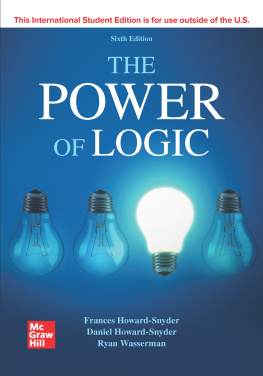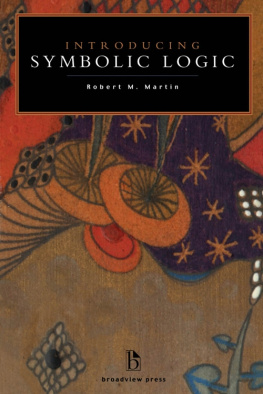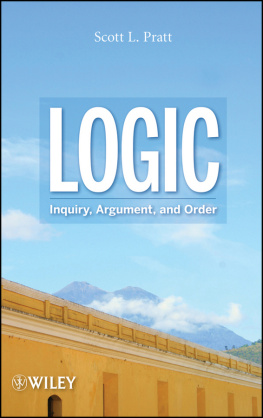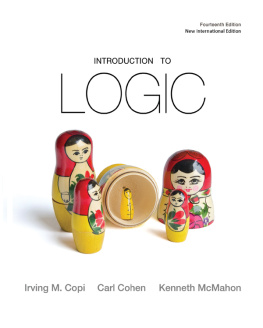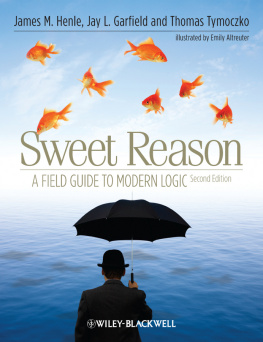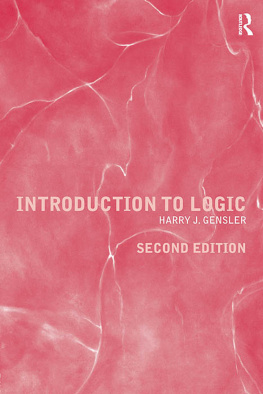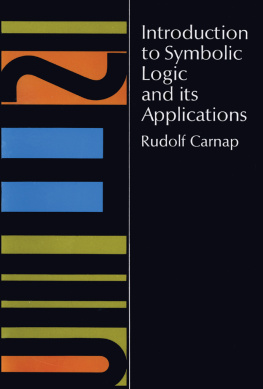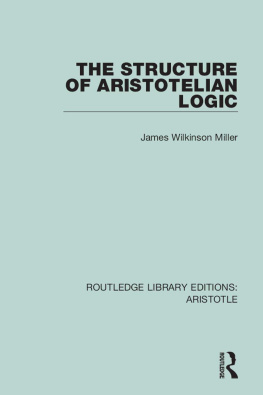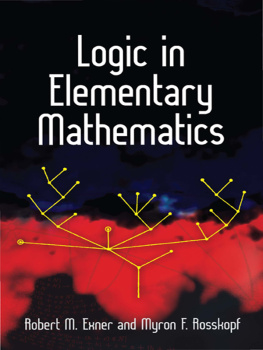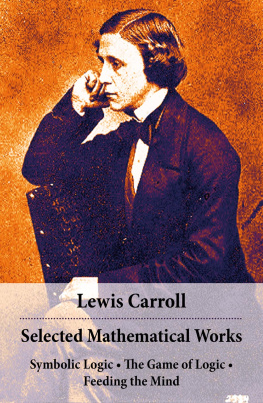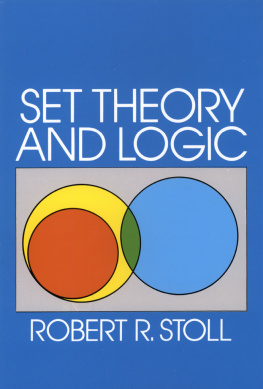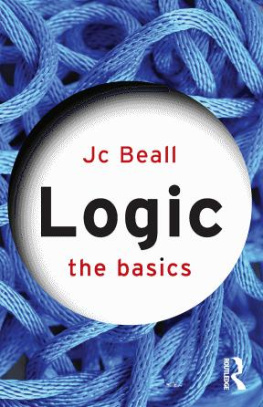
The Power of Logic
i
ii

The Power of Logic
SIXTH EDITION
Frances Howard-Snyder
Daniel Howard-Snyder
Ryan Wasserman
WESTERN WASHINGTON UNIVERSITY

iii

THE POWER OF LOGIC
Published by McGraw-Hill Education, 2 Penn Plaza, New York, NY 10121. Copyright 2020 by McGraw-Hill Education. All rights reserved. Printed in the United States of America. No part of this publication may be reproduced or distributed in any form or by any means, or stored in a database or retrieval system, without the prior written consent of McGraw-Hill Education, including, but not limited to, in any network or other electronic storage or transmission, or broadcast for distance learning.
Some ancillaries, including electronic and print components, may not be available to customers outside the United States.
This book is printed on acid-free paper.
1 2 3 4 5 6 7 8 9 LCR 24 23 22 21 20 19
ISBN 978-1-260-08465-8
MHID 1-260-08465-5
Cover Image: PeopleImages/Getty Images
All credits appearing on page or at the end of the book are considered to be an extension of the copyright page.
The Internet addresses listed in the text were accurate at the time of publication. The inclusion of a website does not indicate an endorsement by the authors or McGraw-Hill Education, and McGraw-Hill Education does not guarantee the accuracy of the information presented at these sites.
mheducation.com/highered
iv
To our children
Peter
William
Benjamin
and Zo Mae
v

About the Authors
Frances Howard-Snyder is Professor of Philosophy at Western Washington University, where she has taught since 1993. She has a PhD in philosophy from Syracuse University and an MA from the University of Cape Town. She has published articles on topics in normative ethics, philosophy of religion, and metaphysics in The Journal of Philosophy, American Philosophical Quarterly, and Philosophical Studies, among other places. When she is not doing philosophy, she enjoys writing (and reading) fiction and also spending time with her husband, Dan, and her twins, Peter and William.
Daniel Howard-Snyder is Professor of Philosophy at Western Washington University, where he has taught since 2000. He has a PhD from Syracuse University and a BA from Seattle Pacific University. He is editor or co-editor of four books, The Evidential Argument from Evil (Indiana University Press, 1996), Faith, Freedom, and Rationality (Rowman & Littlefield, 1996), Divine Hiddenness (Cambridge, 2002), and The Blackwell Companion to the Problem of Evil (Blackwell, 2013). He has published articles in, among other places, Philosophy and Phenomenological Research, American Philosophical Quarterly, and Faith and Philosophy. His chief love is his familyFrances, William, and Peterwithout whom his life would be bereft of all joy.
Ryan Wasserman is Professor and Chair of Philosophy at Western Washington University, where he has taught since 2005. He has a PhD from Rutgers University and a BA from Western Washington University. His main philosophical interests are in metaphysics, ethics, and the philosophy of language. He has published articles in many journals, including Mind, Nos, and Philosophical Quarterly. He is also the author of Paradoxes of Time Travel (Oxford University Press, 2018) and a co-editor of Metametaphysics (Oxford University Press, 2008). Apart from philosophy, Ryan enjoys playing basketball, watching football, and spending time with his family.
vi

Brief Contents

vii

Contents
viii
ix
x
Exercise 6.4
Summary of Truth Tables for the Five Compounds
xi
xii
Summary of Universal Instantiation (UI)
xiii
Summary of Arguments from Authority
xiv

Preface
C ritical thinking skills are some of the most prized commodities in todays knowledge-based economy, and the study of logic is one of the best ways to develop these skills. With its emphasis on presenting, understanding, and evaluating arguments, logic has the power to make us quicker, clearer, and more creative thinkers. It can help us to articulate and support our own views and to analyze the views of others.
In short, there are many benefits to the study of logic. But there are also potential obstacles. Logic can be intimidating. It can be frustrating. It can even be boring.
The Power of Logic is written with the hopes of removing these kinds of obstacles. The book features a simple and direct writing style that helps makes even the most technical matters approachable. It features a wealth of helpful tips and on-line resources to combat common frustrations. And it includes hundreds of examples and exercises that give readers the opportunity to apply their critical thinking skills to interesting arguments from philosophy, politics, and religion. Our hope is that these features help to make logic accessible and interesting and that they enable you to put the power of logic to work in your own life.
New Features
We have made many improvements in light of critical reviews and our classroom experience with previous editions. We have also made some very specific improvements as follows:
The book has been heavily rewritten, with a focus on improving specific sections that students have struggled with in the past.
As a new feature, we have introduced many Bright Idea boxes throughout the text, highlighting important tips and reminders.
There are many new definition boxes, which emphasize key concepts and important distinctions.
There are several new summary boxes, with simple, clear descriptions for quick reference and study.
has been completely rewritten, with new introductions to moods, forms, and immediate inferences.
xv
has also been completely rewritten, with new sections, more exercises, and a more detailed discussion of the problems with the Traditional Square of Opposition.
Next page
